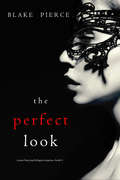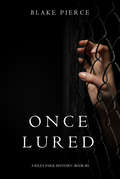
Блейк Пирс
Once Forsaken
CHAPTER FIVE
Riley felt a distinct chill when she got out of her car at Byars College. It wasn’t just from the weather, which was cold enough. The school had a weirdly unwelcoming vibe about it.
She shivered deeply as she looked around.
Students were wandering the campus, bundled tightly against the cold, hurrying to their destinations and barely speaking to one another. None of them looked happy to be here.
Small wonder this place makes students want to kill themselves, Riley thought.
For one thing, the place seemed to belong to a bygone age. Riley almost felt like she was stepping back in time. The old brick buildings had been kept in perfect condition. So had the white columns, relics of times when columns were required for this kind of setting.
The parklike campus was impressively large, given that it was planted right in the nation’s capital. Of course, DC had grown up around it during the nearly two hundred years of its existence. The small, exclusive school had thrived, producing alumni who went on to success in the nation’s most prestigious graduate schools, then into positions of power in business and politics. Students came to schools like this to make and maintain high-level connections that would last a lifetime.
Naturally, it was far too expensive for Riley’s family—even, she felt sure, with the scholarship support they occasionally gave for excellent students from significant families. Not that she would ever want to send April here. Or Jilly, for that matter.
Riley went into the administration building and found the dean’s office, where she was greeted by a stern-looking secretary.
Riley showed the woman her badge.
“I’m Special Agent Riley Paige with the FBI. I called earlier today.”
The woman nodded.
“Dean Autrey is expecting you,” she said.
The woman showed Riley into a large, gloomy office with heavy, dark wood paneling.
An elegant, somewhat elderly man stood up from his desk to greet her. He was tall, with silver hair, and he wore an expensive three-piece suit with a bow tie.
“Agent Paige, I presume,” he said with a chilly smile. “I’m Dean Willis Autrey. Please have a seat.”
Riley sat down in front of his desk. Autrey sat down and swiveled in his chair.
“I’m not sure I understand the nature of your visit,” he said. “Something to do with the unfortunate passing of Lois Pennington, isn’t it?”
“Her suicide, you mean,” Riley said.
Autrey nodded and steepled his fingers.
“Hardly an FBI case, I would think,” he said. “I called the girl’s parents, gave them the school’s heartfelt condolences. They were devastated, of course. The whole thing was so unfortunate. But they didn’t seem to have any specific concerns.”
Riley realized that she had to choose her words carefully. She wasn’t here on an assigned case—in fact, her superiors at Quantico wouldn’t approve of this visit at all. But maybe she could manage to keep Autrey from finding that out.
“Another family member has expressed misgivings,” she said.
She figured there was no need to tell him she meant Lois’s teenaged sister.
“How unfortunate,” he said.
He seems to like using that word—unfortunate, Riley thought.
“What can you tell me about Lois Pennington?” Riley asked.
Autrey was starting to seem bored now, as if his mind were elsewhere.
“Well, nothing that her family hasn’t told you, I’m sure,” he said. “I didn’t know her personally, but …”
He turned toward his computer and typed.
“She seems to have been a perfectly ordinary first-year student,” he said, looking at the screen. “Reasonably good grades. No reports of anything untoward. Although I see that she did get some counseling for depression.”
“But she’s not the only suicide at your school this year,” Riley said.
Autrey’s expression darkened a little. He said nothing.
Before leaving home, Riley had done a little research into the two suicides that Tiffany had mentioned.
“Deanna Webber and Cory Linz both allegedly killed themselves last semester,” Riley said. “Cory’s death was right here on campus.”
“‘Allegedly’?” Autrey asked. “A rather unfortunate word, I think. I’ve not heard anything to the contrary.”
He turned his face slightly away from Riley, as if to pretend she wasn’t even there.
“Ms. Paige—” he began.
“Agent Paige,” Riley corrected.
“Agent Paige—I’m sure that a professional such as yourself is aware that the suicide rate among college students has increased over recent decades. It’s the third leading cause of death among people in the undergraduate age group. There are more than a thousand suicides on college campuses each year.”
He paused, as if to let those facts sink in.
“And of course,” he said, “some schools experience clusters in a given year. Byars is a demanding school. It’s unfortunate but rather inevitable that we should get somewhat more than our share of suicides.”
Riley suppressed a smile.
The figures April had researched a couple of days ago were about to come in handy.
April would be pleased, she thought.
She said, “The national average of college suicides is about seven point five out of one hundred thousand. But just this year, three of your students out of seven hundred have killed themselves. That’s fifty-seven times the national average.”
Autrey raised his eyebrows.
“Well, as I’m sure you know, there are always—”
“Outliers,” Riley said, managing again not to smile. “Yes, I know all about outliers. Even so, the suicide rate at your school strikes me as exceptionally—unfortunate.”
Autrey sat looking away in silence.
“Dean Autrey, I’m under the impression you’re not happy to have an FBI agent poking around here,” she said.
“As a matter of fact, I’m not,” he said. “Should I feel otherwise? This is a waste of your time and mine, and of taxpayers’ money as well. And your presence here might give the impression that something is amiss. There’s nothing amiss here at Byars College, I assure you.”
He leaned across his desk toward Riley.
“Agent Paige, what branch of the FBI are you with exactly?”
“The Behavioral Analysis Unit.”
“Ah. Right nearby in Quantico. Well, you might want to keep in mind that many of our students come from political families. Some of their parents have considerable influence over the government—the FBI included, I imagine. I’m sure we don’t want this sort of thing getting back to them.”
“This sort of thing?” Riley asked.
Autrey swiveled back and forth in his chair.
“Such people might be prone to register complaints with your superiors,” he said with a significant look.
Riley felt a tingle of unease.
She sensed that he’d guessed she wasn’t here in an official capacity.
“It’s really best not to stir up trouble where no problem exists,” Autrey continued. “I’m only making this observation for your benefit. I’d hate for you to run afoul of your superiors.”
Riley almost laughed aloud.
Running “afoul” of her superiors was practically routine for her.
So was getting suspended or fired and then getting reinstated again.
It didn’t scare Riley in the least.
“I see,” she said. “Anything not to taint your school’s reputation.”
“I’m glad we see eye to eye,” Autrey said.
He rose to his feet, obviously expecting Riley to leave.
But Riley wasn’t ready to leave—not yet.
“Thank you for your time,” she said. “I’ll be on my way as soon as you give me the contact information for the families of the previous suicides.”
Autrey stood glaring at her. Riley glared back without moving from her chair.
Autrey glanced at his watch. “I have another appointment. I must go now.”
Riley smiled.
“I’m in a bit of a hurry too,” she said, looking at her own watch. “So the sooner you give me that information, the sooner we both can get on with things. I’ll wait.”
Autrey frowned, then sat down at his computer again. He typed a little, and then his printer rumbled. He handed the sheet with the information to Riley.
“I’m afraid that I’ll have to register a complaint with your superiors,” he said.
Riley still didn’t move. Her curiosity was mounting.
“Dean Autrey, you just mentioned that Byars gets ‘somewhat more than its share’ of suicides. Just how many suicides are we talking about?”
Autrey didn’t reply. His face reddened with anger, but he kept his voice quiet and controlled.
“Your superior at BAU will be hearing from me,” he said.
“Of course,” Riley said with measured politeness. “Thank you for your time.”
Riley left the office and the administration building. This time the cold air felt bracing and invigorating.
Autrey’s evasiveness convinced Riley that she’d come upon a nest of trouble.
And Riley thrived on trouble.
CHAPTER SIX
As soon as Riley got into her car, she went over the information Dean Autrey had given her. Details about Deanna Webber’s death began to come back to her.
Of course, she remembered, bringing up old news stories on her cell phone. The congresswoman’s daughter.
Representative Hazel Webber was a rising politician, married to a prominent Maryland lawyer. Their daughter’s death had been in the headlines last fall. Riley hadn’t paid much attention to the story at the time. It seemed more like salacious gossip than real news—the sort of thing Riley thought was nobody’s business but the family’s.
Now she thought differently.
She found the phone number for Congresswoman Hazel Webber’s office in Washington. When she dialed the number, an efficient-sounding receptionist answered.
“This is Special Agent Riley Paige, with the FBI’s Behavioral Analysis Unit,” Riley said. “I’d like to arrange a meeting with Representative Webber.”
“May I ask what this is about?”
“I need to talk with her about her daughter’s death last fall.”
A silence fell.
Riley said, “I’m sorry to disturb the congresswoman and her family about this terrible tragedy. But we just need to tie up a few loose ends.”
More silence.
“I’m sorry,” the receptionist said slowly. “But Representative Webber isn’t in Washington right now. You’ll need to wait until she gets back from Maryland.”
“And when might that be?” Riley asked.
“I couldn’t say. You’ll just have to call back.”
The receptionist ended the call without another word.
She’s in Maryland, Riley thought.
She ran a quick search and found that Hazel Webber lived in Maryland horse country. It didn’t look as though the place would be hard to find.
But before Riley could start her car, her cell phone buzzed.
“This is Hazel Webber,” the caller said.
Riley was startled. The receptionist must have contacted the congresswoman immediately after hanging up on Riley. She certainly hadn’t expected to hear back from Webber herself, much less so quickly.
“How can I help you?” Webber said.
Riley explained again that she wanted to talk about some “loose ends” regarding her daughter’s death.
“Could you be a bit more specific?” Webber asked.
“I’d rather do that in person,” Riley said.
Webber was quiet for a moment.
“I’m afraid that’s impossible,” Webber said. “And I’ll thank you and your superiors not to trouble me and my family any further. We’re just now beginning to heal. I’m sure you understand.”
Riley was struck by the woman’s icy tone. She didn’t detect the slightest trace of grief.
“Representative Webber, if you can give me just a little bit of your time—”
“I said no.”
Webber ended the call.
Riley was dumbstruck. She had no idea what to make of the terse, awkward exchange.
All she knew for sure was that she’d touched a nerve with the congresswoman.
And she needed to go to Maryland right away.
*
It was a pleasant two-hour drive. Since the weather was good, Riley took a route that included the Chesapeake Bay Bridge, paying the toll in order to enjoy the drive across the water.
She soon found herself in Maryland horse country, where handsome wooden fences enclosed pastures, and tree-lined lanes led to elegant homes and barns set far back from the road.
She pulled up to the gate outside the Webbers’ estate. A heavyset uniformed guard stepped out of his shack and approached her.
Riley showed the guard her badge and introduced herself.
“I’m here to see Representative Webber,” she said.
The guard stepped away and spoke into his microphone. Then he stepped toward Riley again.
“The congresswoman says there’s been some sort of mistake,” he said. “She isn’t expecting you.”
Riley smiled as broadly as she could.
“Oh, is she too busy at the moment? That’s okay, my schedule’s not tight. I’ll wait right here until she has time.”
The guard scowled, trying to look intimidating.
“I’m afraid you’ll have to leave, ma’am,” he said.
Riley shrugged and acted as if she didn’t take his meaning.
“Oh, really, it’s all right. No trouble at all. I can wait right here.”
The guard stepped away and spoke into his microphone again. After glaring at Riley silently for a moment, he went into his shack and opened the gate. Riley drove on through.
She drove through a broad, snow-patched pasture, where a couple of horses trotted freely about. It was a peaceful scene.
When she reached the house, it was even larger than she had expected—a contemporary mansion. She glimpsed other well-kept buildings just beyond a slight rise in the rolling landscape.
An Asian man wordlessly met her at the door. He was about as large as a sumo wrestler, which made his formal, butler-like suit seem grotesquely inappropriate. He led Riley through a vaulted corridor with a floor of expensive-looking reddish-brown wood.
Finally she was greeted by a small, grim-looking woman who wordlessly led her into an almost eerily neat office.
“Wait here,” the woman said.
She left, shutting the door behind her.
Riley sat in a chair near the desk. Minutes passed. She felt tempted to take a look at materials on the desk or even on the computer. But she knew that her every move was surely being recorded by security cameras.
Finally, Representative Hazel Webber swept into the room.
She was a tall woman—thin but imposing. She didn’t look old enough to have been in Congress for as long as Riley supposed—nor did she look old enough to have a college-aged daughter. A certain stiffness around her eyes might be habitual or Botox-induced or both.
Riley remembered seeing her on television. Normally when she met someone she’d seen on TV, she was struck by how different they looked in real life. Weirdly, Hazel Webber looked exactly the same. It was as if she were truly two-dimensional—an almost unnaturally shallow human being in every possible way.
Her outfit also puzzled Riley. Why was she wearing a jacket over her lightweight sweater? The house was certainly warm enough.
Part of her style, I guess, Riley figured.
The jacket gave her a more formal, businesslike look than just slacks and a sweater. Perhaps it also represented a kind of armor, a protection against any genuine human contact.
Riley stood up to introduce herself, but Webber spoke first.
“Agent Riley Paige, BAU,” she said. “I know.”
Without another word, she sat down at her desk.
“What are you here to tell me?” Webber said.
Riley felt a jolt of alarm. Of course, she had nothing to tell her. Her whole visit was a bluff, and Webber suddenly struck her as the kind of woman who wasn’t easily bluffed. Riley was in over her head and had to tread water as hard as she could.
“I’m actually here to ask you for information,” Riley said. “Is your husband at home?”
“Yes,” the woman said.
“Would it be possible for me to talk with both of you?”
“He knows that you’re here.”
Her non-answer disarmed Riley, but she took care not to show it. The woman fastened her cold, blue eyes on Riley’s. Riley didn’t flinch. She just returned her stare, bracing herself for a subtle battle of wills.
Riley said, “The Behavioral Analysis Unit is investigating an unusual number of apparent suicides at Byars College.”
“Apparent suicides?” Webber said, arching a single eyebrow. “I’d hardly describe Deanna’s suicide as ‘apparent.’ It seemed plenty real to my husband and me.”
Riley could swear that the temperature in the room had dropped a few degrees. Webber betrayed not the slightest hint of emotion at her mention of her own daughter’s suicide.
She’s got ice water in her veins, Riley thought.
“I’d like you to tell me what happened,” Riley said.
“Why? I’m sure you’ve read the report.”
Of course, Riley had done nothing of the kind. But she had to keep bluffing her way along.
“It would help if I could hear it in your own words,” she said.
Webber was silent for a moment. Her stare was unwavering. But so was Riley’s.
“Deanna was injured in a riding accident last summer,” Webber said. “Her hip was badly fractured. It seemed likely that it would have to be replaced altogether. Her days of riding in competitions were over. She was heartbroken.”
Webber paused for a moment.
“She was taking oxycodone for the pain. She overdosed—deliberately. It was intentional, and that’s all there is to it.”
Riley sensed that she was leaving something unsaid.
“Where did it happen?” she asked.
“In her bedroom,” Webber said. “She was snug in her bed. The medical examiner said she died of respiratory arrest. She looked like she was asleep when the maid found her.”
And then—Webber blinked.
She literally blinked.
She had faltered in their battle of wills.
She’s lying! Riley realized.
Riley’s pulse quickened.
Now she had to really apply the pressure, probe with exactly the right questions.
But before Riley could even think of what to ask, the office door opened. The woman who had brought Riley here came in.
“Congresswoman, I need a word with you, please,” she said.
Webber looked relieved as she got up from her desk and followed her assistant out the door.
Riley took some long, slow breaths.
She wished she hadn’t been interrupted.
She was sure she’d been about to crack through Hazel Webber’s deceptive facade.
But her opportunity wasn’t gone.
When Webber came back, Riley would start in on her again.
After less than a minute, Webber returned. She seemed to have recovered her self-assurance.
She stood by the open door and said, “Agent Paige—if you really are Agent Paige—I’m afraid I must ask you to leave.”
Riley gulped hard.
“I don’t understand.”
“My assistant just called the BAU. They have absolutely no investigation underway concerning suicides at Byars College. Now whoever you are—”
Riley pulled out her badge.
“I am Special Agent Riley Paige,” she said with determination. “And I’m going to do everything I can to make sure that such an investigation gets underway as soon as possible.”
She walked past Hazel Webber out of the office.
On her way out of the house, she knew that she had made an enemy—and a dangerous one at that.
It was a different sort of danger from what she usually faced.
Hazel Webber wasn’t a psychopath whose weapons of choice were chains, knives, guns, or blowtorches.
She was a woman without a conscience, and her weapons were money and power.
Riley preferred the kind of adversary she could punch out or shoot. Even so, she was ready and willing to deal with Webber and whatever threats she could muster.
She lied to me about her daughter, Riley kept thinking.
And now Riley was determined to find out the truth.
The house seemed empty now. Riley was surprised to leave without encountering a single soul. She felt as if she could rob the place and not get caught.
She went outside and got into her car and drove away.
As she approached the manor gate, she saw that it was closed. Standing just inside were both the burly guard who had let her in and the enormous butler. Both had their arms crossed, and they were obviously waiting for her.
CHAPTER SEVEN
The two men definitely looked threatening. They also looked a little bit ridiculous—the smaller of the two wearing his guard uniform, his much more massive partner wearing his ultra-formal butler’s outfit.
Like a pair of circus clowns, she thought.
But she knew they weren’t trying to be funny.
Riley pulled her car to a stop right in front of them. She rolled down her window, looked out, and called to them.
“Is there some sort of problem, gentlemen?”
The guard came closer, directly in front of her car.
The colossal butler lumbered toward her passenger window.
He spoke in a rumbling bass voice.
“Representative Webber would like to clear up a misunderstanding.”
“And that would be?”
“She wants you to understand that snoops aren’t welcome here.”
Now Riley got the picture.
Webber and her assistant had come to the conclusion that Riley was an imposter, not an FBI agent at all. They probably suspected that she was a reporter getting ready to write some sort of exposé about the congresswoman.
No doubt these two guys were used to dealing with nosy reporters.
Riley pulled out her badge again.
“I think there has been a misunderstanding,” she said. “I really am a special agent with the FBI.”
The big man smirked. He obviously believed the badge was a fake.
“Step out of the car, please,” he said.
“I’d rather not, thank you,” Riley said. “I’d really appreciate if you’d open the gate.”
Riley had left her door unlocked. The big man opened it.
“Step out of the car, please,” he repeated.
Riley groaned under her breath.
This isn’t going to end well, she thought.
Riley stepped out of the car and shut the door. The two men moved to stand side by side a short distance from her.
Riley wondered which of them was going to make the first move.
Then the huge man cracked his knuckles and strode toward her.
Riley took a couple of steps toward him.
As he reached out for her, she grabbed him by his lapel and the sleeve of his left arm and tugged him off balance. Then she pivoted all the way around on her left foot and ducked down. She barely felt the man’s massive weight as his whole body flew over her back. He slammed loudly and upside-down against the car door and then landed head first on the ground.
The car got the worst of it, she thought with fleeting dismay.
The other man was already moving toward her, and she whirled to face him.
She landed a kick to his groin. He bent over with a huge groan, and Riley could see that the altercation was over.
She snatched the man’s pistol from his hip holster.
Then she surveyed her handiwork.
The larger man still lay in a crumpled heap beside the car, staring at her with a terrified expression. The car door was dented, but not as badly as Riley had feared. The uniformed guard was on his hands and knees gasping for breath.
She held the pistol, handle first, toward the guard.
“You seem to have misplaced this,” she said in a pleasant voice.
His hands trembling, he reached for the gun.
Riley pulled it away from him.
“Huh-uh,” she said. “Not until you open the gate.”
She took the man by the hand and helped him to his feet. He staggered to the shack and threw the switch that opened the iron gate. Riley walked toward the car.
“Excuse me,” she told the enormous man.
Still looking quite terrified, the man scrambled sideways like a giant crab, getting out of Riley’s way. She got into the car and drove through the gate. She tossed the pistol on the ground as she drove away.
They don’t think I’m a reporter anymore, she thought.
She was also sure that they would let the congresswoman know that pretty quickly.
*
A couple of hours later, Riley pulled her car into the parking lot at the BAU building. She sat there for a few moments. She hadn’t been here once during her month on leave. She hadn’t expected to be back so soon. It felt really strange.
She turned off the engine, removed the keys, got out of the car, and went into the building. As she made her way toward her office, friends and colleagues spoke to her with varying degrees of welcome, surprise, or restraint.
She stopped at the office of her usual partner, Bill Jeffreys, but he wasn’t there. He was probably out on an assignment, working with someone else.
She felt a slight pang of sadness—even jealousy.
In many ways, Bill was her best friend in the world.
Still, she figured maybe this was just as well. Bill didn’t know that she and Ryan were together again, and he wouldn’t approve. He had held her hand too many times during her painful breakup and divorce. He’d find it hard to believe that Ryan was a changed man.
When she opened the door to her own office, she had to double check to make sure she was in the right place. It all looked far too neat and well organized. Had they given her office to another agent? Had someone else been working here?
Riley opened a drawer and found familiar files, though now in better order.
Who would have straightened everything up for her?
Certainly not Bill. He would have known better.
Lucy Vargas, maybe, she thought.
Lucy was a young agent that both she and Bill had worked with and liked. If Lucy was the culprit behind all this neatness, at least she’d done it in a spirit of helpfulness.
Riley sat at her desk for a few minutes.
Images and memories came to her—the girl’s coffin, her devastated parents, and Riley’s terrible dream of the hanged girl surrounded by mementos. She also remembered how Dean Autrey had evaded her questions, and how Hazel Webber had outright lied.
She reminded herself of what she’d said to Hazel Webber. She’d promised to get an official investigation underway. And it was time to make good on that promise.
She picked up her office phone and buzzed her boss, Brent Meredith.
When the team chief picked up, she said, “Sir, this is Riley Paige. I wonder if I could—”
She was about to ask for a few minutes of his time when his voice thundered.
“Agent Paige, get in my office right now.”
Riley shuddered.
Meredith was plenty mad at her about something.







